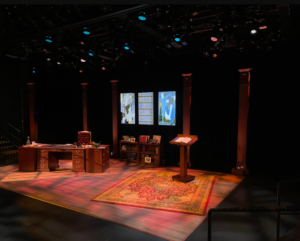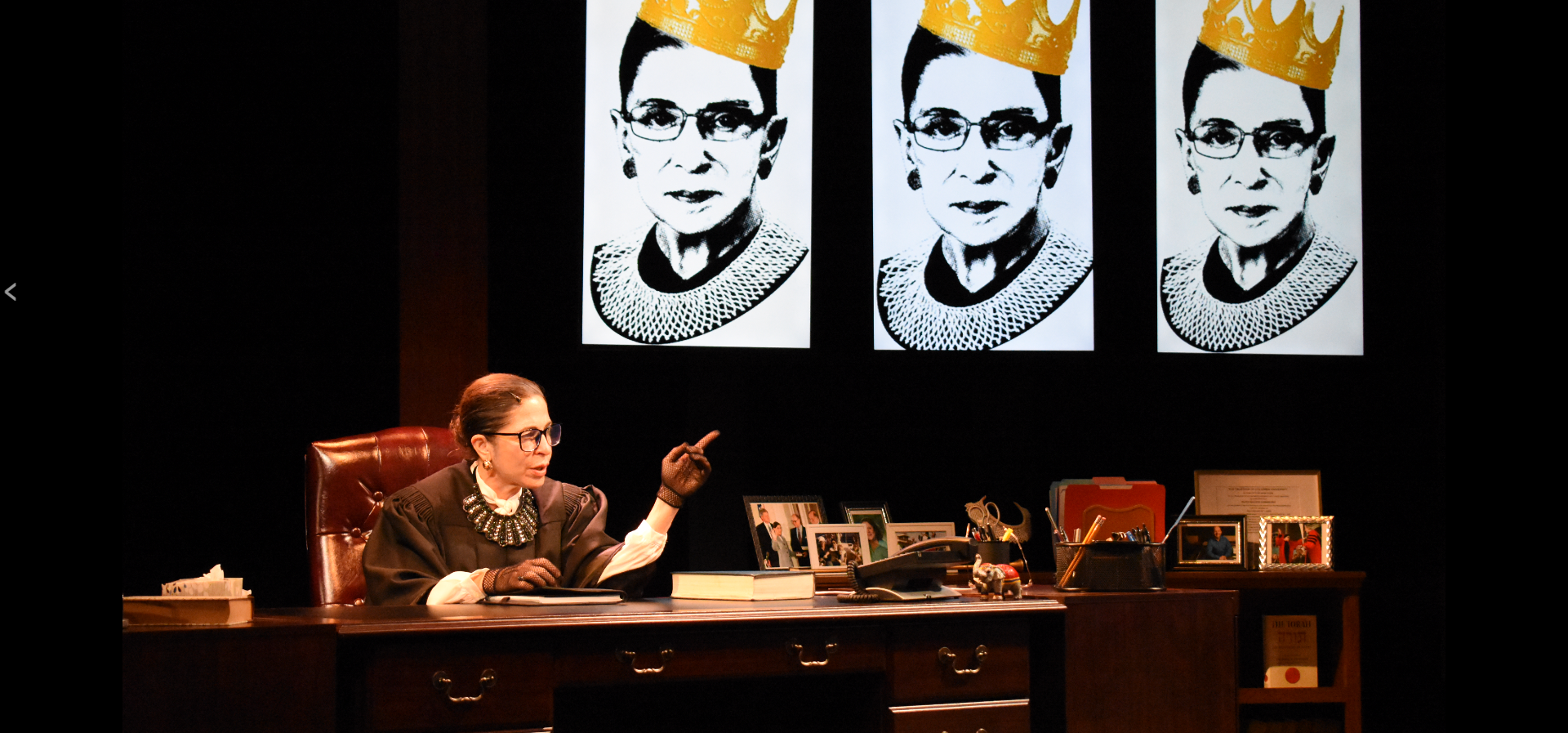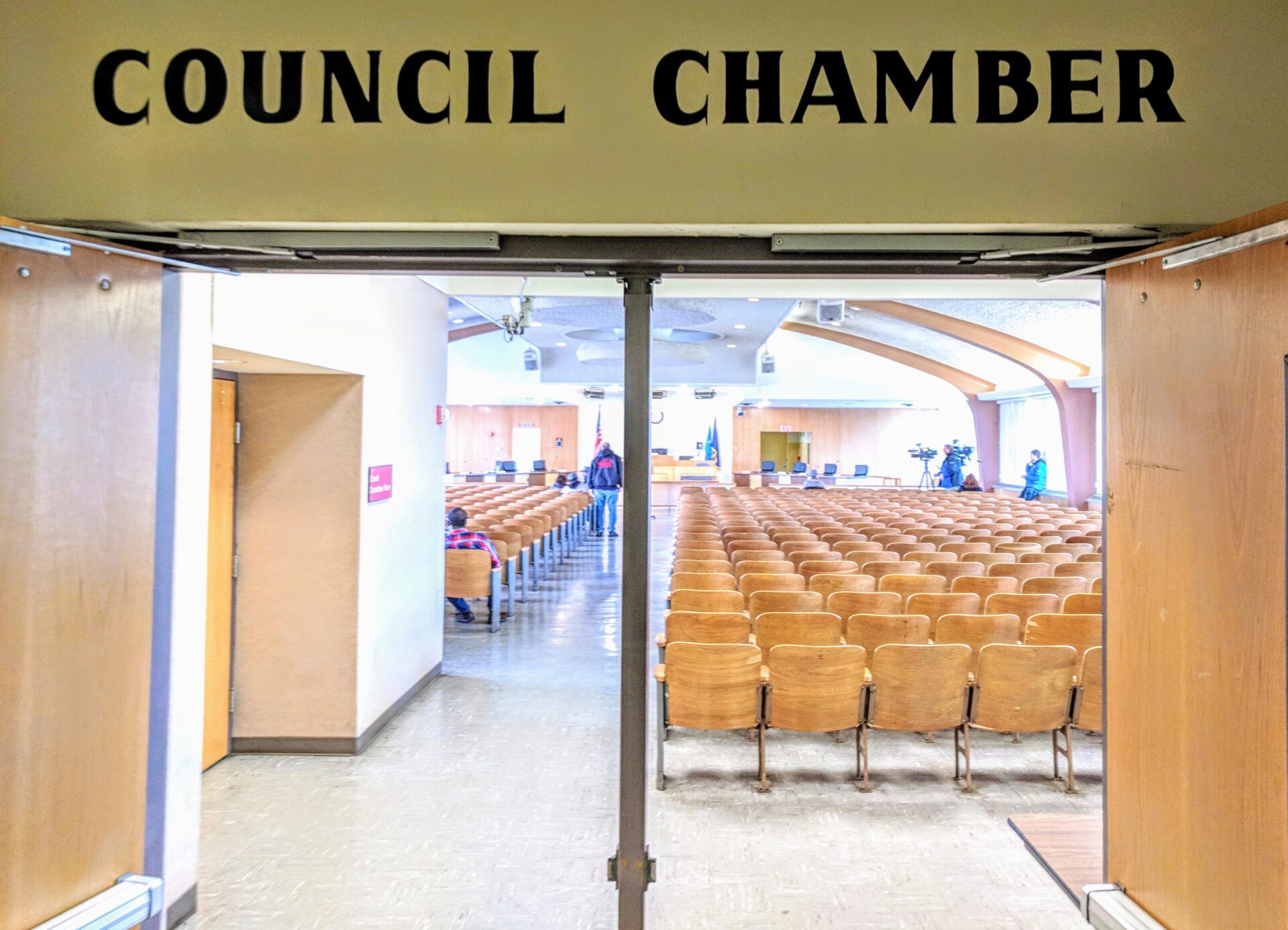By Tom Travis
“How do we fill in the gaps of her very public persona?” Actress Michelle Azar said that question propelled her as she relied on books and movies to tell the story of Ruth Bader Ginsburg (RPG) in a new play by playwright Rupert Holmes. The play depicts “human” moments showing RBG to be cranky, not getting enough sleep and even sexual. “What are those human moments like? How human can we make her? What kind of license do we have to portray these moments from her life?” Azar said.
The answers to those questions about the momentous RBG will come to life at The Whiting Auditorium in Flint’s Cultural Center in All Things Equal – The Life and Trials of RBG, at 7:30 p.m. Thursday, May 4. Azar portrays the notorious character of RBG in this 90-minute, one-woman production, now nearing its end of a 16-city run. More information about the play or to buy tickets follow this link.
In a phone interview with EVM last week, Azar who is cast as RBG, reflected on how, during a time in American history when women, let alone Jewish women, didn’t go into law, RBG graduated at the top of her class from both Columbia and Harvard. In a life-long fight against sexism, ageism, and threats to women’s rights, RBG rose to become only the second female to be appointed to the U.S. Supreme Court; she was nominated by then-President Bill Clinton. She remains a cultural icon even since her death in 2020 at the age of 87.
In All Things Equal Azar is alone onstage throughout the 90-minute play. She confessed “getting the lines right” were important to her because RBG’s words were so important.
As the play begins, RBG is in her 80’s, wearing black glasses, her hair in a bun and of course with her signature lace collar on her justice robe.
“The wonderful mystery of theater is how do we age? What do we have to do to convey this aging?” asks Azar. The character of RBG appears from her 20s to her 80s. The only time someone else appears in the play is in “projections” displayed behind RBG on a screen. The “projections” are of key people in RBG’s life and career including a scene with a projection of Bill Clinton when she’s appointed to the Supreme Court.. Azar said the stage and set design basically consists of a large wood desk, a bookcase and a podium with “projections” changing throughout the play.

The set of the play All Things Equal by playwright Rupert Holmes. (Photo source: The Stander Group, Inc.)
RBG transcends generational divides
“I hear from my daughters what Ruth was saying about this and about that. What Ruth said is palpable to the younger generations. There is a moment in the end of the play where I (RBG) speak to the granddaughter of a friend of mine. Ruth talks to this young woman, includes her in her thoughts and tries to convey to her that anybody and everybody is responsible and can get involved at any level.”
“I believe Ruth understood her influence to society across the generations, even to the younger generations. But I don’t think RBG thought of herself as something better than anyone else. She just believed we can all do this. I’m so honored to use this voice I’ve been given and I was able to be born at a time this voice is able to be hear so I can give the audience this energy that is awesome.” Azar said.
“But when Ruth was getting older she just kept standing more in her power, asking more questions. I think that’s what the generational divide is attracted to in RBG,” Azar said.
Azar reflected on her own 89-year-old father, two years older than RBG when she passed, about how he refuses to get a computer, has no idea how to use his phone and speaks very little English after all these years in the U.S. “He’s a lovely, adorable man, I love him.”
Wife, mother and Supreme Court Justice
Azar described as “touching” and “heavy” several scenes in the play, such as when RBG receives a cancer diagnosis — four different times in her life. “She was a wife, she was a mother along with having the responsibilities on the U.S. Supreme Court,” Azar noted. RBG did not come from wealth and Azar attributes that to part of her wide cross generational appeal and the admiration she received in her life.
The play depicts moments of the “humanness of RBG” when her husband Marty himself receives a cancer diagnosis, and another time Marty and RBG had the flu at the same time with kids at home, and a scene when one of her children broke a leg. “Even with all her responsibilities to her family and the court she remained a powerhouse to the end,” Azar said.
Actress Azar connects with RBG in many ways
Azar, like RBG is Jewish, and the daughter of immigrants — her life closely connected to that part of RBG’s life of faith. Azar’s father landed in New York from Israel and met Azar’s mom, an immigrant from Poland. Azar’s mother’s family escaped the Holocaust by many years but certainly the legacy of Judaism has helped Azar connect to the persona of RBG. While the play is not about RBG’s Judaism Azar said, it is a “backdrop” to who and what RBG is all about.
Raised in Judaism Azar connects RBG in their mutual faith
Azar is married to a rabbi in the reform tradition of Judaism and lives in Beverly Hills, CA where they have raised their children. Azar’s daughter graduated from UM-Ann Arbor last week. Azar said she’s raised her kids to be able to get up and read from the Torah and be leaders in their communities, “I’m proud of that.”
Azar said that “tradition” and the ways of Judaism have been very important to her. Her husband was a synagogue cantor before becoming a rabbi; at the time, she recalled, “I was a 25-year old actress living in Los Angeles, ‘bopping around to different auditions’ and not always dressed appropriately for synagogues. So I always kept an extra outfit in my car just in case had to attend synagogue or an occasion that would call for something more formal, being the wife of a rabbi,” recalled Azar when she first met her rabbi husband.
RBG’s sage advice: “Dear, sometimes it’s helpful to be a little deaf”
Some advice RBG’s mother-in-law gave to Ruth, “Dear, sometimes it’s helpful to be a little deaf.”
“I think that’s why she had such a good relationship with Scalia [U.S. Supreme Court Justice Antonio Scalia, a conservative justice who died suddenly in 2016]. She was able to be ‘deaf’ to what their differences were and focus on what they agreed on.”
Scene added about RBG’s decision not to retire
Another issue addressed in the play was criticism RBG received for not retiring earlier so that then-President Obama could have found another like minded justice to replace her on the Supreme Court. That scene was not originally in the play but playwright Holmes added the scene after the play was on the road. Azar says, “It was incredible and courageously relevant to put that scene in. And from what I’m hearing from our audiences they are really appreciative that it was put in.”
An old friend suggests Azar for the RBG role
Azar said she came about getting the role last summer. An old friend Azar had known when she was in her 20s doing extra work and commercials contacted her about the role.
“We had lost touch over the years, but then she moved to L.A. and she found me and cast me in a production she had written.
“One day last summer she called me and said I think there’s something here [referring to the role of RBG].
Azar admitted she only knew of RBG from The Notorious RBG movie. “So I put my hair back, put on some glasses and tried it. And then I got obsessed with the role and portraying RBG,” she said.
There were four auditions and a Zoom callback. There were lots of different trials with the accent. Azar, who speaks very fast, said she had to practice RBG’s “intentional”, “slow” and measured style of speaking.
Asked if her personal stature matched the small and petite stature of RBG, “Yeah, I’m little,” Azar responded. “Well I might be a half-inch taller than RBG.
All Things Equal
According to a press release from FIM, “All Things Equal offers each theatre goer the chance to better know this woman, her yearning for equality, and her love for this nation’s precious institutions,” according to playwright.
“Holmes invites the audience into the intimacy of Ruth Bader Ginsburg’s life and her many trials: losing her mother the day before she graduated as valedictorian of her high school, being one of only nine young women studying law at Harvard while also raising a daughter and helping her husband battle cancer, fighting for women’s rights in the 1970s and taking courageous stands for human rights amid a splintering and increasingly politicized Supreme Court.
all_things_equal-lobby_board_4-21According to Azar, “To pay homage [to RBG] nightly in a real and authentic way with thoughts and feelings that are both learned from her public persona and inferred from her actions and the insights others had about her demands my full attention. It’s an actor’s dream.”
“Holmes brilliantly captures RBG’s compelling life, leaving no one to wonder why she became a cross-generational role model inspiring tens of millions of Americans and a worldwide following.”
EVM Managing Editor Tom Travis can be reached at tomntravis@gmail.com








You must be logged in to post a comment.